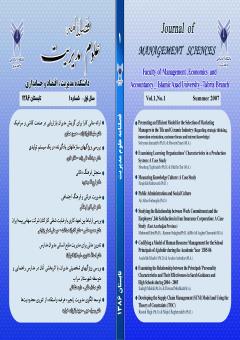Examining the Relationship between the Principals' Personality Characteristics and Their Effectiveness in Sarab Guidance and High Schools during 2004 – 2005
Subject Areas : Business Managementsadegh maleki avarsin 1 * , Davood Moshkati 2
1 - Faculty Member, Department of Educational Sciences, Shabestar Branch, Islamic Azad University, Shabestar, Iran
2 - MSc in Educational Management
Keywords: effectiveness, personality, Suspicious, Trustful, Objective Thought,
Abstract :
This research is about the relationship between principals' personality characteristics and their effectiveness in Sarab guidance and high schools during 2004 - 2005. The statistical population consisted of 290 teachers and 27 managers. The sampling metod was random stratified. For data gathering we used two types of questionnaires with 0.94 reliability. In this research,7 hypotheses were tested by (t-test), and the correlation coefficient and the results indicate there is a meaningful difference between the effectiveness of the principals with warmhearted and coldhearted personalities, and also between the effectiveness of the principals with suspicious and trustful personalities. But there is no meaningful correlation between the principals' effectiveness and objective thought and, there is no meaningful difference between the male and female principals' effectiveness.
Ahmadi, A. (1989). Personality Psychology. Tehran: Amir Kabir Publication, (In Persian).
Alaghehband, A. (1998). Principles of Educational Management. Tehran: Payame Noor University Press, (In Persian).
Bajpai, B. L. (1997). Making Management still MoreEffective.
Cline, A.W. (1990). Female Potential Adminstrator. A Study In Personality.
Evans, J. (2003). Educational Management. Translated by: A., Rahnema, Tehran: Ayezh Publication, (In Persian).
Ghaffarian, W. (2000). Managerial Competencies. Tehran: Industrial Management Publication, (In Persian).
Ghorbani, M. (2000). Conflict Management and Effectiveness at the Organizations. Tehran: Toos Publication, (In Persian).
Grossi, T. (2001). New Approaches to Personality Evaluation. Tabriz: Niko Publishing, (In Persian).
Karimi, Y. (1994). Personality Psychology. Tehran: Payame Noor University Press, (In Persian).
Khoshkhoy, A. (2000). Selection and Selection of Directors in Islamic Society. Mashhad: Nikbakht Publication, (In Persian).
Lee Pham, J. (1991). School Management, Fundamentals and Theories. Translated by: M. A., Naeli, Ahwaz: Shahid Chamran University of Ahwaz, (In Persian).
Luthans, F. (2002). OrganazationalBehavior.
Sharifi, H. (2000). Principles of Psychometrics and Psychosis. Tehran: Roshd Publication, (In Persian).
Soltani, I. (2001). The Effectiveness of Education at Industrial Manufacturing Units. Tehran: Tadbir Magazine 119, (In Persian).
Tirgir, H. (2001). The Relationship between Self-Concept of Managers and Their Performance in Secondary Schools. Journal of Management in Education, 7(28), (In Persian).
Nasr Esfahani, A. (2001). Group Behavior Management. Isfahan: Jihad Publishing House, (In Persian).
_||_
Ahmadi, A. (1989). Personality Psychology. Tehran: Amir Kabir Publication, (In Persian).
Alaghehband, A. (1998). Principles of Educational Management. Tehran: Payame Noor University Press, (In Persian).
Bajpai, B. L. (1997). Making Management still MoreEffective.
Cline, A.W. (1990). Female Potential Adminstrator. A Study In Personality.
Evans, J. (2003). Educational Management. Translated by: A., Rahnema, Tehran: Ayezh Publication, (In Persian).
Ghaffarian, W. (2000). Managerial Competencies. Tehran: Industrial Management Publication, (In Persian).
Ghorbani, M. (2000). Conflict Management and Effectiveness at the Organizations. Tehran: Toos Publication, (In Persian).
Grossi, T. (2001). New Approaches to Personality Evaluation. Tabriz: Niko Publishing, (In Persian).
Karimi, Y. (1994). Personality Psychology. Tehran: Payame Noor University Press, (In Persian).
Khoshkhoy, A. (2000). Selection and Selection of Directors in Islamic Society. Mashhad: Nikbakht Publication, (In Persian).
Lee Pham, J. (1991). School Management, Fundamentals and Theories. Translated by: M. A., Naeli, Ahwaz: Shahid Chamran University of Ahwaz, (In Persian).
Luthans, F. (2002). OrganazationalBehavior.
Sharifi, H. (2000). Principles of Psychometrics and Psychosis. Tehran: Roshd Publication, (In Persian).
Soltani, I. (2001). The Effectiveness of Education at Industrial Manufacturing Units. Tehran: Tadbir Magazine 119, (In Persian).
Tirgir, H. (2001). The Relationship between Self-Concept of Managers and Their Performance in Secondary Schools. Journal of Management in Education, 7(28), (In Persian).
Nasr Esfahani, A. (2001). Group Behavior Management. Isfahan: Jihad Publishing House, (In Persian).

